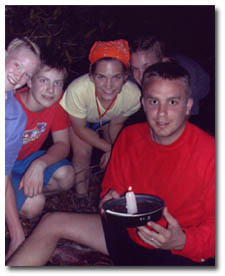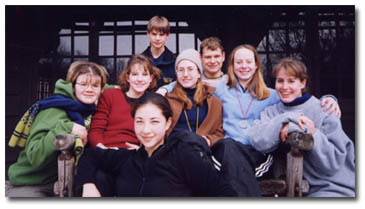 Adventure
Adventure
An adventure is an experience that has an element of uncertainty about it. Either the outcome or the setting is unknown or unfamiliar. Adventure offers a certain type of freedom and intrinsic reward not found in the rational, packaged and controlled everyday world; a world dominated by extrinsic desires. As a community of learners, we undertake such experiences to build character while instilling that intensity of individual and collective aspiration on which the entire society depends for its survival.
Self-Discovery
The ideal learning process mirrors experiences found in outdoor adventure. Students learn best when presented with challenges that require emotion, creativity, craftsmanship, perseverance, and achievement. Learning is enhanced when students learn to be self-managed, and self-motivated. Educators must teach students to take risk, to confront fear, and to seek experiences outside of established comfort zones
| "Without self-discovery, a person may still have self-confidence, but it is a self-confidence built on ignorance and it melts in the face of heavy burdens. Self-discovery is the end product of a great challenge mastered, when the mind commands the body to do the seemingly impossible, when strength and courage are summoned to extraordinary limits for the sake of something outside the self - a principle, an onerous task, another human life." |
| F. Charles Froelicher, Colorado Outward Bound. 1962 |
Creative Thinking
Learning opportunities need to be created that allow for inquiry, discovery, exploration, variety, and challenge. When students are involved in solving their own problems and working out their own ideas, they begin to build a rich foundation of life experience and knowledge. Students must be challenged to follow their ideas and to find their voice.
Self-Determination
As a community of learners, students add to the strength of the community by understanding that they are responsible for their individual growth as students and as contributing members of the learning community. As self-learners and self-managers, students should learn to depend less on their teachers and school and more on their own convictions and resources. Collegiality & Competition
Collegiality & Competition
Students should place the interest of the learning community before their own. Learning is as much a collective effort as it is individual. Collegiality can only be created in an environment of mutual respect and trust where the free exchange of ideas is promoted. As part of a learning community, students need to share in the collective experience as a way to further their own personal and interpersonal growth. Competition is most successful when used to challenge students to meet rigorous standards and achieve their personal best.
Success & Failure
Achievement is the struggle by which obstacles are overcome. When the solution to a problem is not apparent, learning how to persevere is essential. It is through struggle that we find meaning. Failure should be seen as a way to enhance learning by providing the opportunity to overcome adversity.
Diversity & Inclusion
It is through the sharing of diverse ideas and perceptions that students become engaged in the world around them. Empathy and understanding are critical to the creation of a learning environment that is intellectually open and honest.
The Environmental Ethos
Establishing a connection and respect with the natural world is critical to personal growth. Living in natural environments in a close-knit community is a catalyst for increased student awareness of themselves and their roles. The interdependence of the individual to the human community, and the human community to the ecological community creates a learning situation whereby students can experience cause and effect relationships and cycles of life that were once a part of everyday living. Solitude & Reflection
Solitude & Reflection
Solitude and reflection clarifies and amplifies the context and meaning behind life experience. Learning happens best when students are given time to be alone so that what is learned may be generalized and used again.
Stewards of the Community
Students need to share in the internal rewards that result from actions having little to do with self-interest and material gain. Meaningful opportunities to serve through one's talents and skills for the betterment of others teaches students to become self-motivated and directed. As a community of learners, students must experience the value of compassion through direct action on behalf of the larger community or specific individuals. Compassion, among all other emotions, is capable of uniting individual strength with collective need.